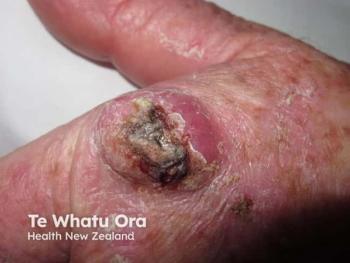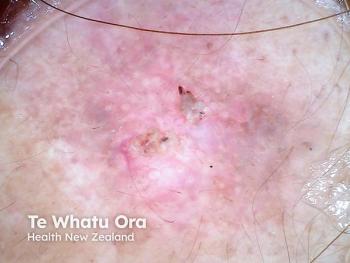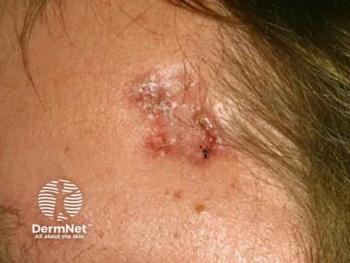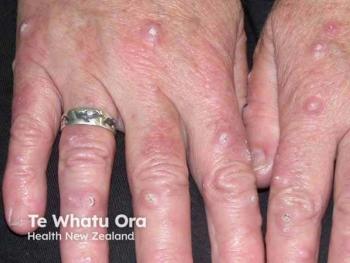
Palliative Perspective: Aligning Melanoma Treatment with Patient Goals
There is room for improvement in dermatology palliative care; training can help providers raise that standard.
Patients with serious dermatologic illnesses such as melanoma need more palliative care than they presently receive, according to a recent editorial in JAMA Dermatology. And dermatologists are already well-positioned to deliver such care, authors add.1
“While dermatology and palliative care are rarely mentioned together,” wrote authors led by Christopher S. Yang, BA, “dermatologists grapple with questions of palliation daily as we encounter illnesses that we can help, but not cure.”1 Yang is a fourth-year medical student at Northwestern University Feinberg School of Medicine in Chicago who will begin a dermatology residency there in 2023.
“Dermatologists already look at diseases through a palliative lens all the time,” he told Dermatology Times®. Dermatologists are adept at recognizing and treating physical symptoms such as pain and pruritus, he explained, and they often prioritize quality of life (QOL) when making patient-management decisions.
Victor Quan, MD, a third-year dermatology resident at Northwestern, added, “Dermatologists also have special bonds with patients that provide insight into psychosocial well-being, quality of life, and goals of care.”
Anyone who has had a total-body skin examination knows well that such exams are intimate, said Yang. “And dermatologists try to put patients at ease by making what seems like ‘small talk.’ Naturally, though, dermatologists learn so much about our patients—what they do for work, who their families are, what they enjoy on the weekends—all the things that bring them meaning in life.”
Nevertheless, he said, patients with serious and potentially life-threatening illnesses like melanoma can benefit from more direct, honest conversations about symptoms, prognoses, and care goals. More than a decade ago, experts recommended confronting difficult patient conversations with honesty and humility.2 Such an approach is highly relevant in melanoma, Yang said, as studies show that patients with both early and advanced melanoma report significant unmet palliative needs and psychosocial distress.3,4
“The distress comes from broad worries like fear of death and concern for loved ones,” he said, “as well as melanoma-specific worries like uncertainty about the risk of recurrence.” These patients could benefit from candid conversations that start with assessing their understanding of their disease, preferences for information delivery, and use of coping strategies.
For patients with advanced melanoma, dermatologists can ask questions such as the following:
- What are your greatest worries about your melanoma?
- What sustains you when you face serious challenges in your life?
- How can we help you live well?
- If you have to choose between living longer and quality of life, how would you approach this balance?
“While these questions are challenging to ask,” Yang said, “the answers will likely serve as an important foundation for understanding what the patient needs in terms of physical and psychosocial support.” For example, authors suggested that for patients with melanoma who are frail, elderly, or have limited life expectancy, less aggressive interventions might produce greater comfort and QOL than would guideline-recommended surgeries.
Often, he said, patients and physicians mistakenly view palliative care as the point where treatments attempt not to modify disease, but simply to provide comfort. “In our paper,” said Yang, “we advocate for increased adoption of primary palliative care skills—the ability to take a palliative perspective, identify symptoms holistically, and conduct basic discussions about quality of life and goals of care.”
Barriers to wider adoption of palliative principles include the time, training, and rehearsal required. Specialties including as internal medicine, surgery, and pediatrics have found success through efficient interventions such as hour-long communication-skills workshops.5,6 “With appropriate training,” he said, “we believe that short and focused conversations can help patients receive more goal-consistent care and even save time by avoiding repeated or roundabout discussions.”
Disclosures:
Yang and Quan report no relevant financial interests.
References:
1. Yang CS, Quan VL, Charrow A. The power of a palliative perspective in dermatology [published online ahead of print, 2022 May 11]. JAMA Dermatol. 2022;10.1001/jamadermatol.2022.1298. doi:10.1001/jamadermatol.2022.1298
2. Gawande A. Letting go: what should medicine do when it can’t save you? The New Yorker. https://www.newyorker.com/magazine/2010/08/02/letting-go-2. August 2, 2010. Accessed May 25, 2022.
3. Tesio V, Ribero S, Castelli L, et al. Psychological characteristics of early-stage melanoma patients: a cross-sectional study on 204 patients. Melanoma Res. 2017;27(3):277-280. doi:10.1097/CMR.0000000000000348
4. Dunn J, Watson M, Aitken JF, Hyde MK. Systematic review of psychosocial outcomes for patients with advanced melanoma. Psychooncology. 2017;26(11):1722-1731. doi:10.1002/pon.4290
5. Patell R, Gutierrez A, Lee N, Neuendorf K. Practicing communication skills for responding to emotionally charged questions. J Palliat Care. 2018;33(4):209-214. doi:10.1177/0825859718777319
6. Paulsen K, Wu DS, Mehta AK. Primary palliative care education for trainees in U.S. medical residencies and fellowships: a scoping review. J Palliat Med. 2021;24(3):354-375. doi:10.1089/jpm.2020.0293
Newsletter
Like what you’re reading? Subscribe to Dermatology Times for weekly updates on therapies, innovations, and real-world practice tips.











